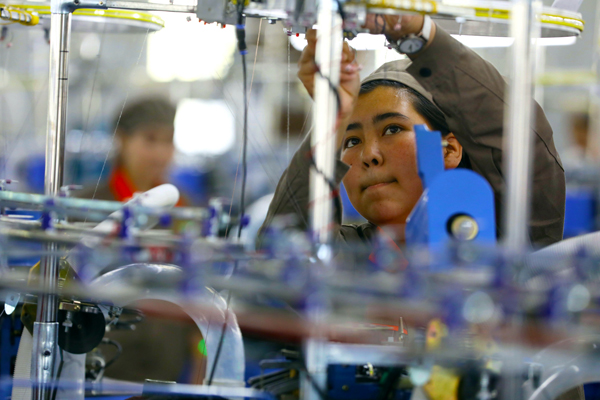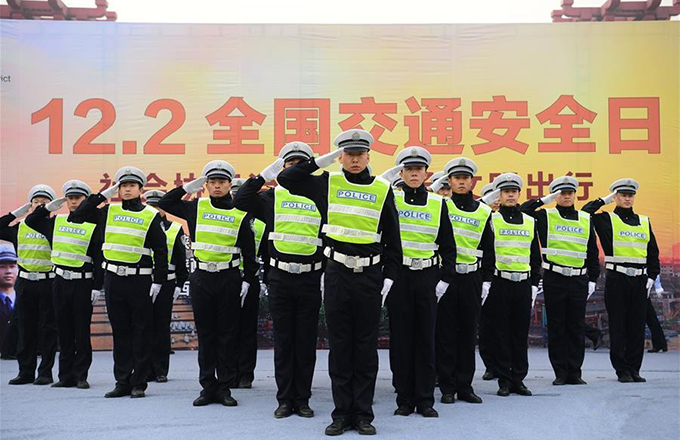Xinjiang marches ahead with confidence
A worker fixes a thread on the production line at Huafu Top Dyed Melange Yarn Co in Aksu, a southern city in the Xinjiang Uygur autonomous region. Photo By Zhu Xingxin / China Daily
Editor's note: The Xinjiang Uygur autonomous region has achieved remarkable results in economic, social, cultural and human rights development over the past decades, especially since the 18th National Congress of the Communist Party of China. The following are the viewpoints of some Xinjiang officials and researchers on the region's progress:

Poverty reduced, jobs created on big scale
Thanks to the support of the central government and help from other regions, Xinjiang has implemented new development projects, taken effective measures to ensure local residents get equal opportunities for individual and social development, and made great efforts to improve people's livelihoods and promote ethnic solidarity.
Xinjiang's economic development has accelerated in recent years, with its GDP increasing from 750.50 billion yuan ($110.23 billion) in 2012 to 961.70 billion yuan last year, an increase of 9.9 percent year-on-year and 2.6 percentage points higher than average national growth.
Last year, Xinjiang's per capita GDP reached 40,427 yuan, making it a middle-income region according to the World Bank. People's living conditions in the region have considerably improved, with the per capita disposable income of farmers rising from 6,394 yuan in 2012 to 10,183 yuan last year, up 9.7 percent year-on-year, and urban residents from 17,921 yuan to 28,463 yuan, a growth of 9.5 percent year-on-year.
During the 2012-16 period, 2.28 million urban jobs were created in Xinjiang and its registered urban jobless rate declined from 3.39 percent to 3.22 percent. With the implementation of a series of targeted poverty alleviation measures, Xinjiang's registered impoverished population decreased from 2.61 million in 2013 to 1.22 million last year, and seven impoverished counties and 1,286 impoverished villages were lifted out of the "poverty list".
Zhang Chunlin, vice-chairman of the government of the Xinjiang Uygur autonomous region and director of the region's development and reform commission
Ethnic equality is a statutory principle
Equality is the core value of human rights, and ethnic equality is a core constitutional principle of China and the cornerstone of its ethnic policy. A white paper recently published by the State Council Information Office, titled "Human Rights in Xinjiang-Development and Progress" shows that all ethnic groups in China, including those in Xinjiang, enjoy equal political, economic, cultural, educational and social rights.
Members of all ethnic groups in Xinjiang enjoy the same status and the same rights, and their political rights as citizens are fully protected. The 12th National People's Congress, China's top legislature, has a total of 60 deputies from Xinjiang, of whom 38, or 63 percent, are from ethnic minority groups. And of the 550 deputies to the 12th People's Congress of Xinjiang Uygur autonomous region, 363, or 66 percent, have ethnic minority origins. Xinjiang is the only autonomous region in China with all three levels of autonomous divisions, namely autonomous region, autonomous prefecture and autonomous county. And people's congresses and people's governments of these autonomous administrative divisions at different levels exercise the autonomous power to manage their local affairs.
Gao Jianlong and Li Xiaoxia, researchers at the Xinjiang Academy of Social Sciences
Freedom of religion integral to region
As an integral part of human rights, freedom of religion is respected and protected in Xinjiang. China's Constitution grants its citizens the freedom of religion, which is also reflected in the Regulations on Religious Affairs promulgated by the State Council (China's Cabinet) and the Regulations on Religious Affairs of the Xinjiang Uygur autonomous region.
It is up to the individual concerned to decide which religion he or she wants to follow or practice. No citizen is discriminated against or treated unfairly because he or she believes in, or does not believe in, a given religion. Anyone who encroaches on citizens' freedom of religion will be held accountable.
The legitimate rights of religious organizations, too, are safeguarded. Xinjiang has 112 religious organizations that receive help from the government, so that they play a greater role in social development.
Steady improvements have been made in the training system for clerics and in raising religious bodies' self-management capabilities, and the government makes arrangements for Xinjiang's clerics to study in the more developed parts of China, in order to broaden their vistas and improve their overall qualities. And the central government supports the Xinjiang Islamic Institute to expand its campus, improve teaching standards, and enroll more students.
Ma Pinyan and Yu Shangping, researchers at the Xinjiang Academy of Social Sciences




















